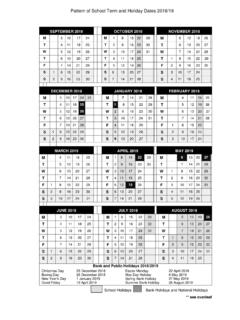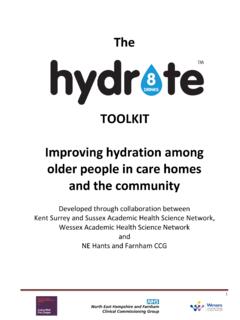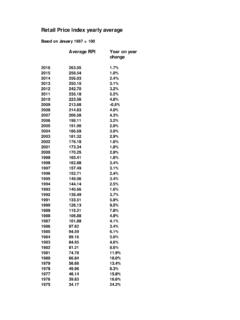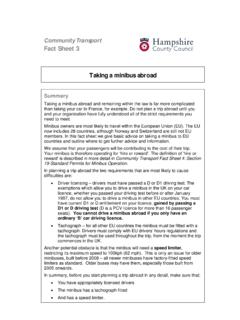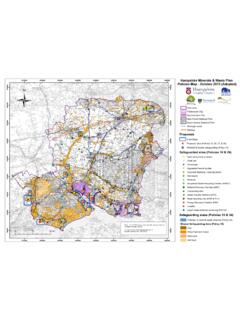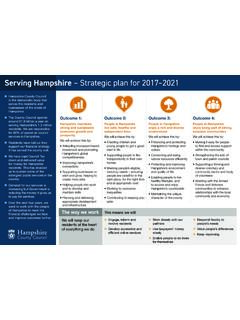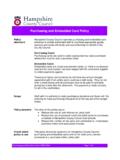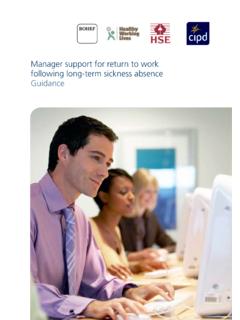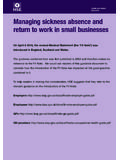Transcription of How to Guide - Hampshire
1 how to Guide . Managing sickness absence 1. Purpose Hampshire Constabulary is committed to supporting the wellbeing of Police Officers, Police Staff and Special Constables and to promote attendance at work. The policy and this how to Guide define the framework for managing sickness absence and the steps managers and individuals must take to ensure attendance remains at an acceptable standard. The intentions of the policy and this how to Guide are to support the wellbeing of the workforce and to enable individuals to be well and in attendance at work. However, if, after intervention, an individual's attendance is not at the required level, this policy provides a framework for managers to manage sickness absence appropriately.
2 All managers are responsible for supporting, monitoring and appropriately managing sickness absence within their command/. department. The Managing sickness absence policy and this how to Guide have been written in compliance with the Police Regulations 2003, Police (Performance) Regulations 2012, the Home Office Guidance on Police Misconduct, Unsatisfactory Performance and Attendance Management procedures, the Code of Ethics for Policing and the Police Staff Council Handbook 2017. All individuals are required to comply with the Managing sickness absence policy at all times. This how to Guide must be read in conjunction with the Managing sickness absence policy.
3 2. Scope The policy and this how to Guide apply to the following staff groups: Police Officers (Chief Superintendent and below). Police Staff (including HC hosted units). Special Constables (of Independent Patrol Status). how to Guide - Managing sickness absence Page 1 of 63. For the purpose of this how to Guide the above staff groups are referred to as individuals. Where a specific provision applies to a particular staff group this is explicit in the relevant how to Guide section. The policy and this how to Guide do not apply to Police Officers or Police Staff in a probationary period, Volunteers, Contractors or Agency workers, including Tempforce.
4 Individuals of non Hampshire Constabulary bodies are excluded from the policy and this how to Guide and should refer to their own employer's policies and procedures. 3. how to use this document Principles This document accompanies the Managing sickness absence policy. It provides additional procedural information to underpin application of the policy. The document has been written in the second person to address the line manager, referred to throughout the document as you'. Throughout this Guide , a requirement' is indicated by the word 'must'. The word should' is used to indicate actions or processes that are considered to be best practice.
5 All individuals must adhere to the Managing sickness absence policy when using this Guide . Please note that the section numbering in the policy and this how to Guide are not aligned. How do I address Type of concern Refer to the . my concern? Unsatisfactory performance due Managing Performance policy to a lack of skill, knowledge, experience or aptitude Failure to report sickness HR Operations team for advice absence or to provide a statement of fitness for work certificate sickness absence which is not Professional Standards genuine or is an unauthorised department (PSD) for Police absence , or working when off Officers sick Managing Misconduct policy.
6 Police Staff Student Police Officer's - Individual development process absence , behaviour or for Student Officers (FPP. performance concerns 32301). Special Constables Individual development process development or performance for Special Constabulary (FPP. concerns prior to achieving 11704). Independent Patrol Status how to Guide - Managing sickness absence Page 2 of 63. Police Staff - concerns during a Probation period policy for Police Staff probation period (FPP 24109). A concern involving a Staff HR Operations team for advice Association, Federation or Unison representative An individual's concern(s) HR Operations team for advice.
7 About a decision or action If matters are related - use the taken when applying the policy meetings and appeals process within the policy. If matters are unrelated - run the policy and the Grievance policy concurrently. Or, in certain cases action under the policy may pause to address the grievance. If you are unsure of which policy to use please contact HR Operations. how to Guide - Managing sickness absence Page 3 of 63. Contents 4. Introduction ..6. Intended outcomes .. 7. Key definitions .. 7. how to identify and respond to an absence concern .. 8. 5. Short term sickness absence .
8 11. Definition ..11. Movement between the long term and short term Performance Development Review (PDR) ..11. Policy stages ..11. Trigger points short term absence ..11. 6. Informal stage ..12. Informal stage ..12. Return to work interview ..12. how to manage an informal Possible outcomes of the informal stage ..14. how to progress from the informal stage to formal stage one ..14. The purpose of the pre-formal decision meeting ..15. how to invite the individual to a pre-formal decision meeting ..15. Who chairs the pre-formal decision meeting ..15. how to manage the pre-formal decision meeting.
9 16. Possible outcomes of the pre-formal decision meeting ..16. 7. Formal stage ..17. Principles ..17. how to progress through the formal how to invite the individual to a formal stage one or formal stage two meeting ..19. how to invite the individual to a formal stage three hearing ..19. Alternative date ..20. Sharing of Multiple instances of unsatisfactory attendance for Police Officers only ..22. Who chairs the formal meeting/ hearing Police Officers ..22. Who chairs the formal meeting/ hearing Police Staff ..24. Panel conditions ..24. Objection to the panel - stage three hearing ..25.
10 Other meeting/ hearing attendees ..25. Witnesses - for a formal stage three hearing only ..25. Individual's response to the written notice of a formal stage three hearing (invite letter) for Police Officers how to manage a formal meeting/ hearing ..26. Attendance at each formal meeting/ Delays to a formal stage three hearing ..27. Possible outcomes of a formal stage one and formal stage two meeting ..27. Possible outcomes of a formal stage three hearing ..28. how to confirm the decision ..29. how to issue an improvement notice ..30. how to develop an action plan ..30. Review meetings.
